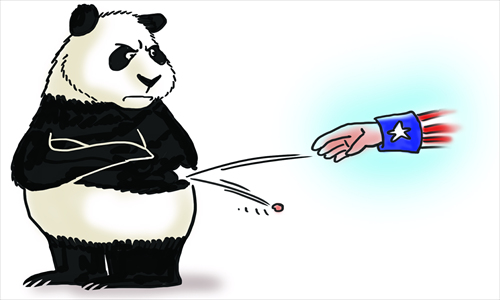
(Illustrator: Liu Rui/GT)
Washington formally announced a $1.83 billion arms sale package to Taiwan on Wednesday. China slammed the sale for interfering in its internal affairs and vowed to impose sanctions on relevant American companies. Chinese pundits see this as new proof of Washington's desire to contain China by roiling cross-Straits relations. In fact, arms sales to Taiwan have already had a negative impact on the U.S..
Washington has to accept it is becoming far less capable of containing China's rise. It may upset the government of the Chinese mainland by making a fuss with Taiwan, but it won't have a real effect.
Washington's primary intent in forging a military relationship with Taiwan is to maintain military balance across the Taiwan Strait. However, the strategy is stretched too thin. Given the mainland's swift and prominent ramp-up in military spending, a military balance can no longer be stricken between the mainland and Taiwan, no matter how many advanced weapons the U.S. sells to Taiwan.
The possibility of using Taiwan to suppress the mainland's growing leverage in its periphery is vanishing. The mainland's economic aggregate is more than 20 times larger than Taiwan's, so the latter has no chance to engage in a military race with the former.
Selling arms to Taiwan doesn't mean Washington would hold on to its promise to "come and rescue" Taiwan when the island is in trouble with the mainland. It is not even a commitment to include Taiwan in its umbrella of protection. Even some Taiwanese strategists have pointed out that Taiwan is too obsessed with the delusion that Washington will come all the way to defend Taiwan.
Washington also cunningly argues that the weaponry deal will bolster Taiwan's confidence when it needs to negotiate with the mainland in other respects. In fact, in such talks, it is always the mainland that makes more room for Taiwan's wellbeing, not because Taiwan has a strong military capability that is feared by the mainland, but because the mainland regards Taiwan as family.
Although the U.S., especially its arms enterprises and political brokers, could reap fat profits from such practices, these companies and individuals might risk losing the second biggest market. The pros and cons are not hard to weigh. In fact, some companies have started to reflect on the deal.
Washington seems to have gone on the offensive in the arms deal, but Beijing can find opportunities to strike back. From the Diaoyu Islands to the South China Sea disputes, the US keeps stirring troubles against China in recent years during the implementation of its "rebalancing to Asia" strategy. China could have resorted to countermeasures but is too prudent to take real action. On the occasion of this arms deal, for which the U.S. has neither moral nor legal ground, Beijing should take the chance to carry out down-to-earth countermeasures, such as halting bilateral communications over military matters and sanctioning relevant U.S. enterprises.
It becomes increasingly obvious that playing the Taiwan card is no longer an effective approach to countering China's rise. On the contrary, it makes Washington take bigger risks to jeopardize a relationship with the Chinese mainland, which is clearly more important.
The US government must have realized that it is necessary to reduce the harm caused by arms sales. During President Barack Obama's administration, the U.S. government slowed down the frequency of arms sales to Taiwan. The last four years has seen just two arms sales. Besides, Washington knows the mainland's red line, and decided not to fulfill Taiwan's request for sensitive weaponry such as submarines and F-16 C/D fighters.
Given that Taiwan's strategic significance is diminishing, to abandon it or not has raised years of debates in the U.S. High-level military and government officials and well-known academic experts have also expressed their concerns that arms sales to Taiwan are not helping the U.S. gain a competitive edge.
In the short term, the U.S. won't stop selling arms to Taiwan, let alone abandon it. But the mainland's rise will eventually make the U.S. realize that arms sales to Taiwan are not helping Washington.
The author is an assistant research fellow at the Institute of Taiwan Studies, Chinese Academy of Social Sciences.


















































